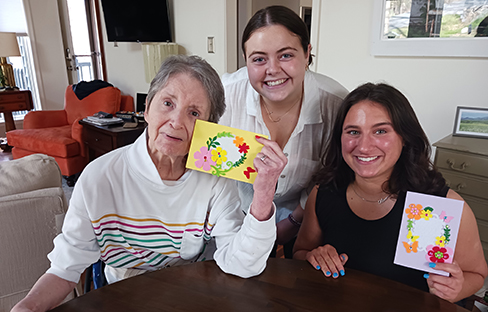
Each semester, JMU students are trained to provide respite to caregivers of those 60 years old and older. Typically, students offer two hours of service each week and work to lift the spirit and stimulate the mind of the care receiver. They are encouraged to implement evidence-based activities and techniques that are proven to improve the quality of life for older adults and those living with dementia. While this is not a medical model, CCN offers the following social-emotional components:
- Socialization: Researchers have shown that incorporating socialization into the daily routines of older adults and those with dementia can help in the following ways: preserve cognitive function, help manage stress and depression, dispels social isolation and improves the overall quality of life.
Ways to implement: conversations, playing games that encourage interaction, cooking with conversation, storytelling - Cognitive stimulation: Researchers have shown that engaging the mind in stimulating activities support those who are older adults or those with dementia in the following ways: improve cognitive function, delay cognitive decline, and improve daily functioning.
Ways to implement: puzzles, games, reading together, doing simple math, playing musical instruments, crossword puzzles - Reminiscence: Researchers have shown that incorporating reminiscence into interactions with older adults with or without dementia can: improve mood and ability to interact, improve behavior and cognition, assist with reducing depression, contribute to life satisfaction, maintain quality of life, and improve the ability to perform activities of daily living.
Ways to Implement: Look at photo albums, make a scrapbook, read old letters/magazines/newspapers, look at and choose long-standing family recipes - Physical Activity: Researchers have shown that incorporating physical activities into the lives of those with dementia may help in the following ways: improve memory and physical health, improve decision making and attention concerns.
Ways to implement: walks, working in the yard, bowling, putt putt, hand massage, aromatherapy (Researchers have shown that using aromas may: promote relaxation, decrease stress and anxiety, increase motivation, and assist in developing healthy sleep patterns.) - Self-Care: Learning about and implementing research based self-care practices offers students, care receivers, and also caregivers the chance to refuel the spirit, and refresh the mind and body. Self-care is essential to the well-being of caregivers and when neglected can cause much distress and a breakdown in the ability to age in place for both the caregiver and the loved one.
Ways to implement: spending time in nature, enjoying music, creative arts activities, deep breathing, engaging joy and laughter, practicing self-compassion.
While student focus is mostly on the care receiver, the mission of CCN is to honor and support the dedicated work of caregivers. It is well documented that caregiving takes a toll on the mind, body, and spirit of the caregiver. Those who are afforded the opportunities of respite often become better equipped to continue the work of caregiving in more balanced and healthier ways.
This course also supports student growth, knowledge, and professionalism. While many students are on the path to work with older adults as a career, all students will have lifelong engagements with older adults and those living with dementia. This course is designed to cast a light on ageism, and the rare, beautiful gifts of building nurturing relationships across the generations.


